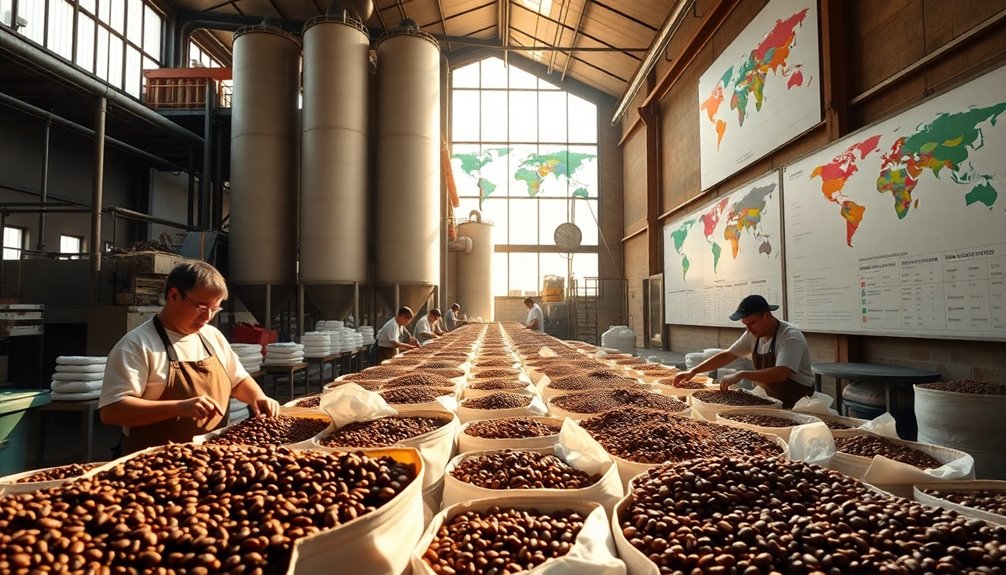Tea gardens today are embracing sustainable practices that emphasize ethical sourcing and environmental care. You'll find that many brands, like Bird & Blend, focus on organic farming and biodiversity preservation. These practices support not just the environment, but also the farmers, ensuring fair wages and improved living conditions. Ethical sourcing impacts communities positively, fostering better education and healthcare. By utilizing advanced techniques, these gardens are increasing yields while protecting natural resources. The shift towards certifications like Fair Trade is making waves as consumers demand responsibility. Keep exploring to uncover more about how these practices are transforming the tea industry.
Key Takeaways
- Sustainable tea gardens implement organic farming practices to enhance soil health and promote biodiversity, yielding healthier tea and protecting ecosystems.
- Ethical sourcing ensures fair wages for tea farmers, supporting approximately 5 million livelihoods and fostering community development through better infrastructure and education.
- Water conservation techniques, such as rainwater harvesting, are vital in tea gardens to protect local resources and mitigate water scarcity issues.
- Fair Trade certifications enhance labor rights, prohibiting child labor and ensuring safe working conditions for tea workers, benefiting around 1.7 million farmers globally.
- Notable sustainable tea brands, like Bird & Blend and Teapigs, are leading the way in ethical sourcing and environmental practices, reflecting growing consumer demand for sustainability.
Importance of Sustainable Tea

As the world sips over 6 billion cups of tea each day, it's crucial to recognize the importance of sustainable tea practices.
Sustainable tea production not only promotes ethical sourcing but also guarantees that tea farmers receive fair wages through Fair Trade certifications.
By focusing on water management, you help protect essential resources and ecosystems important for biodiversity preservation.
Non-sustainable practices can contribute to habitat destruction and a significant environmental impact, including greenhouse gas emissions.
The growing demand for organic tea reflects a consumer preference for ethically produced options.
Emphasizing community development in tea cultivation strengthens local economies and fosters a commitment to sustainability.
Economic Benefits of Ethical Sourcing
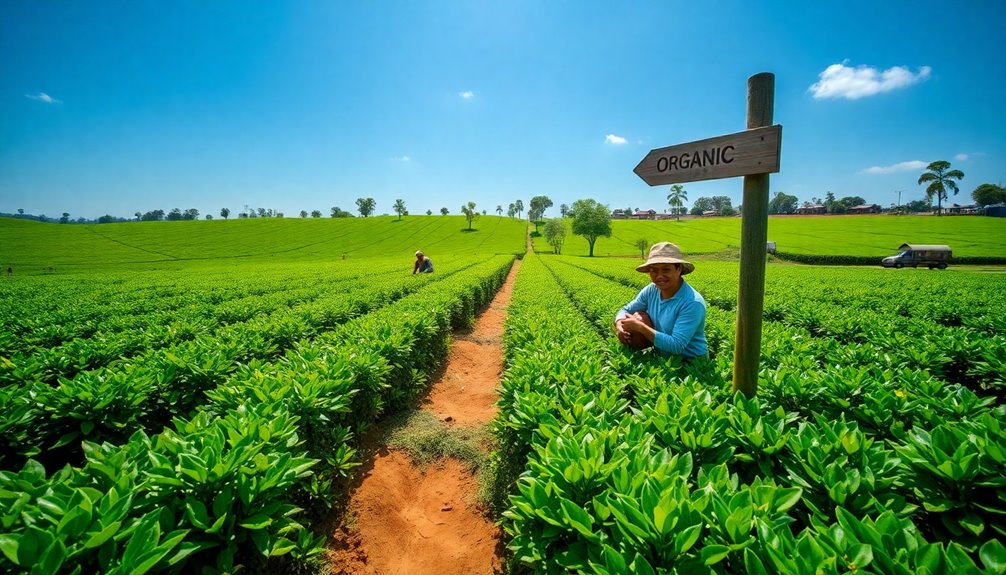
When you choose ethically sourced tea, you're not just enjoying a flavorful beverage; you're also supporting the livelihoods of millions of farmers. Ethical sourcing guarantees fair wages, helping approximately 5 million tea farmers escape poverty and improve their quality of life. Fairtrade practices promote community investment, allowing regions to enhance infrastructure, healthcare, and education. With the organic tea market projected to reach USD 1.5 billion by 2027, consumer preference for sustainable practices is growing. By prioritizing ethical sourcing, tea gardens achieve financial stability and foster transparent relationships with buyers, boosting brand loyalty and customer retention. Additionally, similar to how gold can act as a safe haven during market downturns, ethically sourced tea can provide a stable source of income for farmers during economic instability.
| Economic Benefits | Community Investment | Consumer Preference |
|---|---|---|
| Fair wages for farmers | Improved healthcare | Sustainable choices |
| Long-term stability | Enhanced education | Support for fairtrade |
| Transparent relations | Better infrastructure | Growth in organic market |
Environmental Practices in Tea Gardens

In tea gardens, you'll find a commitment to environmental practices that truly make a difference.
Water conservation techniques play an essential role in protecting local resources, while biodiversity preservation strategies enhance the ecosystem.
Plus, adopting organic farming practices not only benefits the land but also guarantees healthier tea for everyone.
Water Conservation Techniques
While maintaining lush tea gardens, water conservation techniques play a significant role in ensuring sustainability.
You can implement various methods to enhance water efficiency and promote ethical sourcing. Here are four effective practices:
- Rainwater Harvesting: Capture and store rainwater to reduce wastage and secure a reliable supply during dry spells.
- Drip Irrigation: Use this technique to deliver water directly to plant roots, minimizing evaporation and optimizing usage.
- Mulching Practices: Apply organic materials to retain soil moisture, combat evaporation, and improve overall soil health.
- Contour Planting: Align your planting with the land's contours to reduce runoff and promote better water infiltration.
These strategies not only support sustainable farming but also contribute to the health of your tea gardens.
Biodiversity Preservation Strategies
Maintaining water efficiency in tea gardens not only boosts sustainability but also sets the stage for enhancing biodiversity. By integrating shade trees and undergrowth, you create habitats that promote a balanced ecosystem.
Implementing sustainable practices like organic farming reduces reliance on synthetic inputs, improving soil health and supporting diverse plant and animal life. Polyculture farming allows you to grow multiple crops together, encouraging a wider range of species to thrive.
Additionally, conserving native plant species enhances local ecosystems and provides natural pest control. By practicing habitat conservation and rainwater harvesting, you protect biodiversity and reduce environmental impact, ensuring that your tea cultivation remains ethically sourced while contributing positively to the environment.
Organic Farming Practices
Organic farming practices in tea gardens not only focus on avoiding synthetic pesticides and fertilizers, but they also foster healthier ecosystems.
By implementing these sustainable practices, you can contribute to a better environment while enjoying quality tea. Here are some key aspects of organic farming:
- Soil Health: Using natural compost and crop rotation enriches soil fertility, promoting long-term sustainability.
- Rainwater Harvesting: Collecting rainwater helps conserve water and reduces reliance on external sources.
- Biodiversity: Shade-grown practices support a variety of plant and animal species, enhancing ecosystem balance.
- Fairtrade Certification: This guarantees ethical sourcing and transparency in labor conditions throughout the supply chain.
Embracing these principles minimizes chemical runoff and nurtures the earth for future generations.
Social Impact on Tea Communities

The tea industry plays an essential role in shaping the social landscape of tea-growing communities, as around 5 million farmers depend on tea cultivation for their livelihoods.
By implementing sustainable practices, the industry promotes fair wages and better working conditions, enabling tea farmers to escape poverty and enhance their quality of life.
Ethical sourcing initiatives, like Fair Trade certifications, guarantee producers receive fair prices, fostering community development.
Prioritizing social issues such as labor rights and gender equality creates equitable opportunities for marginalized groups.
Additionally, community development initiatives backed by ethical tea brands focus on healthcare and education, directly benefiting the families and children of tea workers.
These efforts collectively uplift tea communities, paving the way for a brighter future.
Innovations in Sustainable Tea Production

When you think about sustainable tea production, advanced farming techniques and eco-friendly processing methods come to mind.
These innovations not only enhance the quality of tea but also protect the environment.
You'll see how adopting these practices can lead to a more sustainable future for tea gardens.
Advanced Farming Techniques
As sustainable tea production evolves, advanced farming techniques play an essential role in enhancing yields while preserving the environment.
By implementing these methods, you can greatly improve the sustainability of your tea gardens:
- Soil Conservation: Enhance nutrient balance and reduce erosion for healthier tea plants.
- Rainwater Harvesting: Maintain soil health and promote efficient irrigation, reducing water wastage.
- Agroforestry: Cultivate shade-grown tea alongside other crops, promoting biodiversity preservation and natural pest control.
- Precision Agriculture: Use technologies like soil moisture sensors and drones to monitor crop health, leading to lower chemical inputs.
These practices embody ethical sourcing and organic cultivation, ensuring a more sustainable future for tea production while benefiting both the environment and your yields.
Eco-Friendly Processing Methods
Innovative eco-friendly processing methods are transforming sustainable tea production, complementing advanced farming techniques.
By harnessing renewable energy sources like solar and wind power, you can greatly reduce the carbon footprint of tea manufacturing.
Water-efficient processing techniques are also making waves, with closed-loop systems recycling water and minimizing usage.
Choosing steam processing over traditional methods cuts energy consumption while enhancing the natural flavors and health benefits of your tea.
Advanced sorting and grading technologies improve quality control, ensuring only the finest leaves are processed, which supports ethical sourcing and provides better prices for farmers.
Additionally, adopting biodegradable packaging not only reduces waste but also attracts environmentally conscious consumers who demand sustainable products.
These innovations are essential for a greener future in tea production.
Fair Trade Certifications Explained
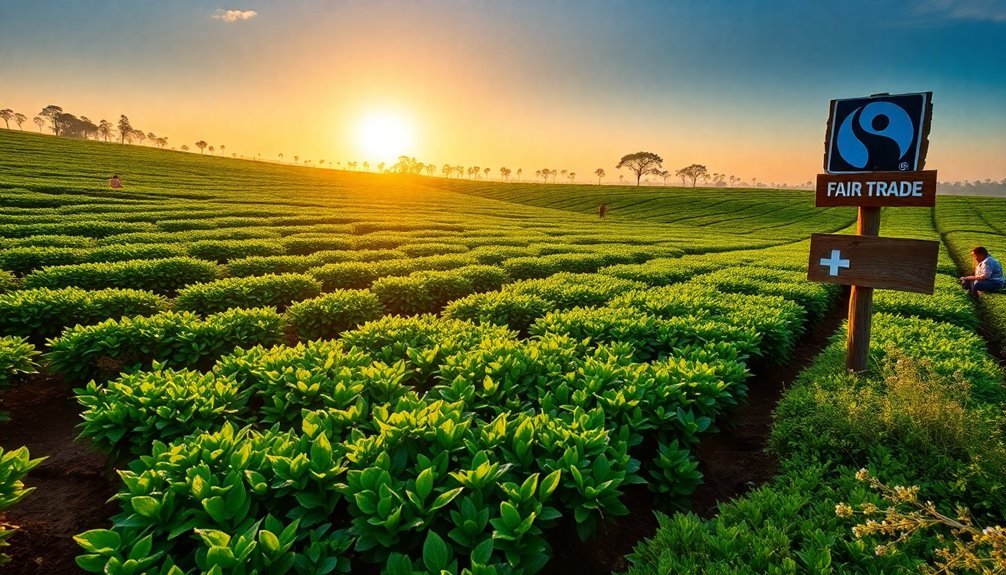
How can Fair Trade certifications transform the lives of tea farmers? By ensuring fair wages, these certifications greatly enhance living conditions and promote community development. Here's how:
- Fair Wages: Farmers receive a premium price above the market rate, directly benefiting their families.
- Labor Standards: The prohibition of child labor and the promotion of safe working conditions safeguard workers' rights.
- Environmental Sustainability: Farmers are encouraged to adopt eco-friendly methods, reducing reliance on harmful agrochemicals.
- Community Projects: The additional income funds essential initiatives in education and healthcare, fostering social justice.
With around 1.7 million farmers benefiting globally, Fair Trade certifications play an important role in creating a more equitable and sustainable tea industry. Moreover, embracing environmental sustainability in tea farming practices can also lead to improved health outcomes for both farmers and consumers.
Challenges Facing Tea Sustainability

While many tea producers aim for sustainability, significant challenges persist that hinder progress in the industry. Only 6% of globally manufactured tea meets voluntary sustainability standards, highlighting a gap in sustainable practices.
Water scarcity is exacerbated by non-sustainable production, which uses up to 4,000 liters of water per kilogram. The tea industry contributes about 4% of global agricultural greenhouse gas emissions, further impacting climate change.
Deforestation for tea plantations leads to biodiversity loss and habitat destruction, threatening local ecosystems. Additionally, labor conditions on tea estates often face criticism, as many workers endure poor wages and working conditions, undermining ethical sourcing efforts.
These environmental impacts and societal issues collectively challenge the industry's path toward sustainability.
Notable Sustainable Tea Brands
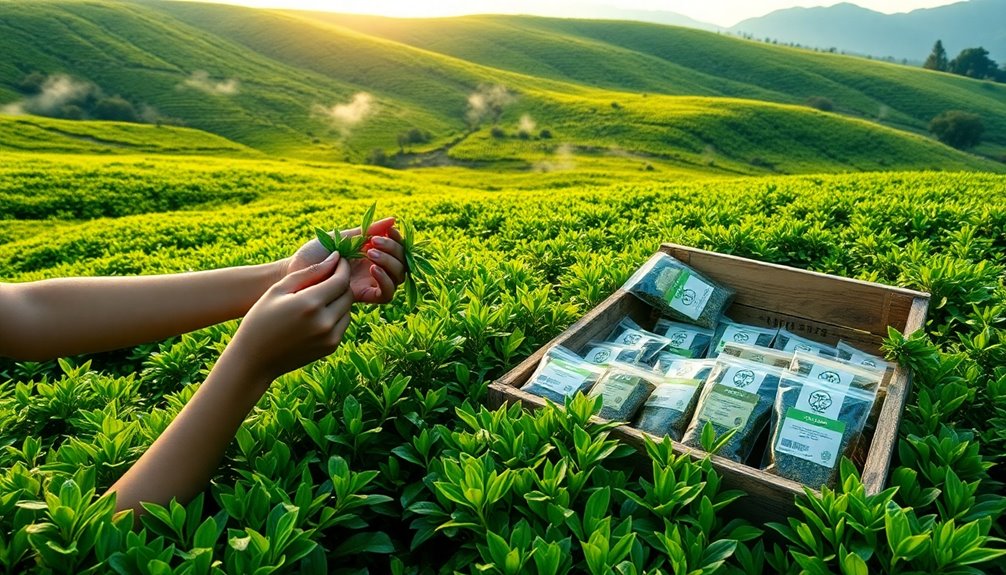
As consumers increasingly seek sustainable options, several tea brands stand out for their commitment to environmental and social responsibility.
Here are some notable ones:
- Bird & Blend: A UK-based B Corp certified brand, it focuses on sustainable practices from leaf to cup, offering innovative tea blends with ethical sourcing.
- Teapigs: Also B Corp certified, this brand prioritizes whole-leaf, all-natural teas and sustainable packaging, promoting responsible consumption.
- Hampstead Organic: Their Fairtrade certified organic teas come in plastic-free packaging, ensuring both ethical sourcing and environmental sustainability.
- Revolver Coop Tea: Sourcing from smallholder farms that adhere to cooperative principles, they promote fair trade practices and community welfare initiatives.
These brands exemplify how tea can be both delicious and sustainable.
Future Trends in Tea Sourcing
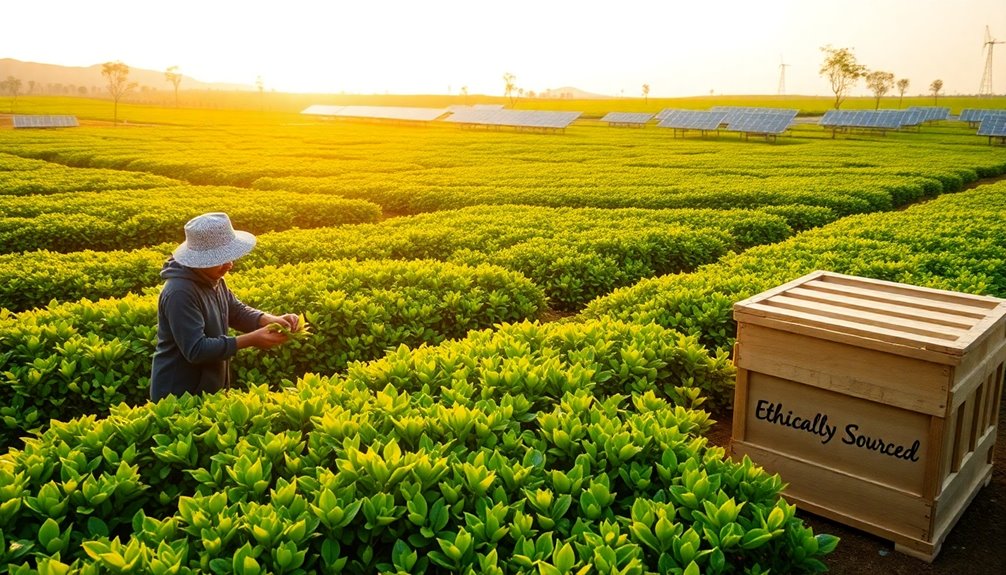
With sustainability becoming a top priority for consumers, the future of tea sourcing is poised for significant transformation. As brands adapt to these shifting consumer values, they are increasingly exploring eco-friendly practices and transparent supply chains. For instance, the Starbucks coffee production process offers a model for integrating sustainability at every step, from sourcing to distribution. This commitment not only enhances brand reputation but also fosters consumer loyalty, ensuring that tea brands remain competitive in an evolving market landscape.
You'll notice a shift towards sustainable practices as brands increasingly adopt ethical sourcing methods. The organic tea market is projected to grow, reflecting your preference for premium quality products.
Fair Trade and Rainforest Alliance certifications will become more common, ensuring environmentally friendly production and fair labor conditions.
Collaborative efforts between tea producers and local communities will enhance social sustainability, improve labor conditions, and promote biodiversity in tea gardens.
As you seek richer flavors and higher antioxidant levels, expect brands to respond with innovative offerings that align with your values, reinforcing the importance of ethical sourcing in the tea industry. Additionally, the popularity of traditional tea ceremonies may inspire consumers to appreciate the cultural significance and mindfulness associated with tea consumption.
Frequently Asked Questions
What Are Some of the Green and Sustainable Practices and Ethical Sourcing Being Practiced by Businesses?
Many businesses are adopting green practices and ethical sourcing to promote sustainability. You might notice companies implementing organic farming, which avoids harmful chemicals and supports biodiversity.
Rainwater harvesting systems help conserve water, while Fairtrade certification guarantees fair prices for producers. Additionally, some brands utilize biodynamic farming techniques to enhance soil health.
What Are the Sustainability Issues With Tea?
When you consider tea sustainability issues, you'll notice several critical concerns.
Non-sustainable practices consume vast amounts of water, harming local resources. The use of pesticides and fertilizers pollutes soil and water, posing risks to ecosystems.
Additionally, tea production contributes considerably to greenhouse gas emissions and deforestation, threatening biodiversity.
Finally, you can't ignore the human rights abuses in some estates, emphasizing the urgent need for ethical sourcing and sustainable farming practices.
Is the Tea Industry Ethical?
You might find that the tea industry faces significant ethical challenges. Many farmers struggle with low wages and poor working conditions, which raises concerns about fairness.
While some tea brands prioritize ethical sourcing, only a small percentage meet sustainability standards. By choosing Fairtrade or organic options, you can support practices that improve livelihoods and promote better labor conditions.
It's crucial to be informed and make choices that align with ethical principles in your tea consumption.
Is Lipton an Ethical Brand?
When you consider if Lipton's an ethical brand, you'll find mixed signals.
While they've committed to sustainability and fair labor practices, challenges remain in fully achieving these goals.
You might notice that only a small portion of their tea meets strict fair trade and organic standards.
Additionally, their reliance on large plantations raises concerns about sustainable practices.
Conclusion
In the world of tea, embracing sustainable practices isn't just a trend; it's a necessity. By choosing ethically sourced tea, you're not only savoring a better brew but also supporting communities and protecting our planet. It's a win-win situation that allows you to enjoy your cup while making a positive impact. So, let's raise our cups to a future where every sip counts, proving that little drops can indeed make a mighty ocean of change.


